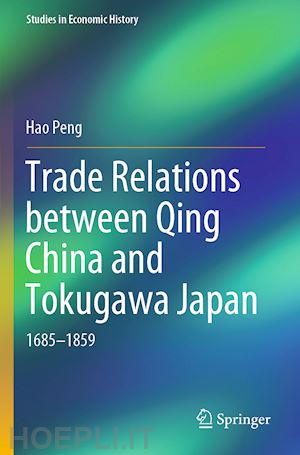
Questo prodotto usufruisce delle SPEDIZIONI GRATIS
selezionando l'opzione Corriere Veloce in fase di ordine.
Pagabile anche con Carta della cultura giovani e del merito, 18App Bonus Cultura e Carta del Docente
1 Introduction.- 2 Commercial Intermediaries in the Nagasaki Trade.- 3 The Mechanism and Functions of the Shinpai Trading Permit System.- 4 Qing China’s Response to the Shinpai Trading Permit System in the Eighteenth Century.- 5 The Underside of the Junks Trade: Maritime Smuggling and Urban Trafficking.- 6 The Copper Trade of Qing China’s Official Merchants and the Affiliated Trading Group.- 7 The Consolidation of Private Chinese Merchants into the Twelve Families Association.- 8 Internal Organization of Chinese Trading Groups in Relation to the Qing Authorities.- 9 Trade Under Pre-Arranged Conditions: A New Commercial Style in the Late Eighteenth Century.- 10 Conclusive Discussions and Comprehensive Historical Narratives.- References.- Index.
Hao Peng is an associate professor in the Graduate School of Economics, Osaka City University. He was born and brought up in China. After getting his first master’s degree in the Graduate School of History, Fudan University, he went to Japan in the autumn of 2005 and continued to study the history of early modern Japan at the Graduate School of Humanities and Sociology, The University of Tokyo. There, he finished his second master’s degree in 2008, and then a doctoral degree in 2012. During the following 4 years, he continued his study at the Historiographical Institute, The University of Tokyo, first as a postdoctoral fellow of the Japan Society for the Promotion of Science and then as a program-specific researcher. He has held his current position since the spring of 2016.
His research book based on his doctoral thesis was published in 2015 by The University of Tokyo Press. The title is Kinsei Nisshin Tsusho Kankeishi (the history of the early modern trade relationship between Qing China and Tokugawa Japan). That book earned him the Nikkei Economic Book Culture Award (by the Nikkei Inc. and Japan Center for Economic Research) in 2015. Besides the history of the Nagasaki trade, his study interests cover maritime history, the history of culture exchange, and comparative urbanization.











Il sito utilizza cookie ed altri strumenti di tracciamento che raccolgono informazioni dal dispositivo dell’utente. Oltre ai cookie tecnici ed analitici aggregati, strettamente necessari per il funzionamento di questo sito web, previo consenso dell’utente possono essere installati cookie di profilazione e marketing e cookie dei social media. Cliccando su “Accetto tutti i cookie” saranno attivate tutte le categorie di cookie. Per accettare solo deterninate categorie di cookie, cliccare invece su “Impostazioni cookie”. Chiudendo il banner o continuando a navigare saranno installati solo cookie tecnici. Per maggiori dettagli, consultare la Cookie Policy.